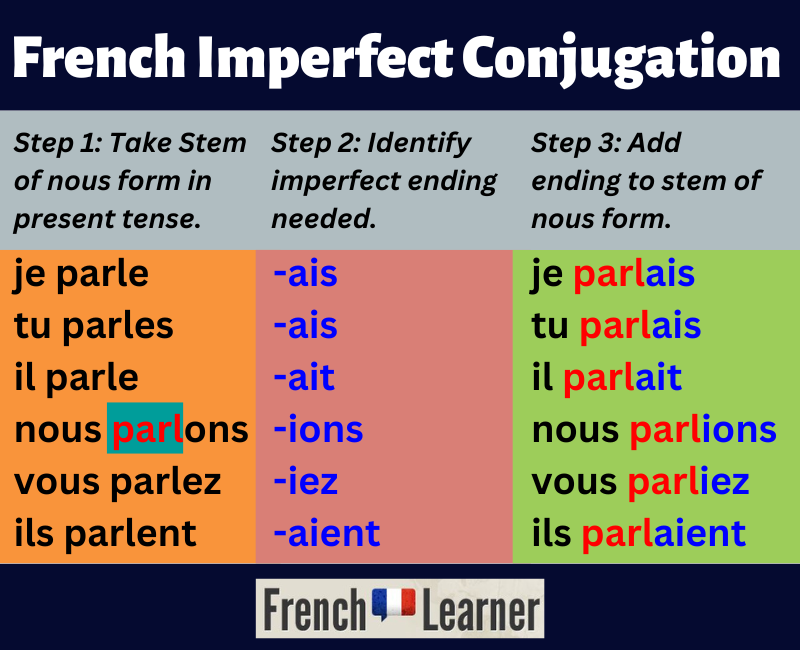The French language has two main past tenses: The passé composé and imperfect (l’imparfait). While the passé composé is used to describe past actions which occured at a specified time, the imperfect is the “used to” tense and is used to describe ongoing past actions. It’s a very common for students to only use the passé composé and totally skip the imperfect. This is a mistake. Knowing the imperfect is essential for speaking French properly. Keep reading.

What is the French imperfect tense?
The French imperfect tense is used to describe states of being and habitual actions in the past. To form the imperfect, drop the -ons on the nous form of the present tense and add the endings-ais, -ais, -ait, -ions, -iez and -aient. For example, Nous parlons -> je parlais (I used to speak, was speaking).
How to conjugate the imperfect
The rule of dropping the -ons of the nous form in the present tense and adding the imperfect endings applies to every verb in the French language. There is one exception: être (to be).

For regular -ir verbs such as finir, drop the -ons from the present tense nous form nous finissons and add the appropriate ending. For example, Je finissais (I was finishing, used to finish).
For irregular -ir verbs such as partir (to leave), drop the -ons from the nous form, nous partons and the appropriate ending. For example, Je partais (I was leaving, used to leave).
| parler (to speak nous parlons | finir (to finish) nous finissons | partir (to leave) nous partons | vendre (to finish) nous venons |
| je parlais tu parlais il parlait nous parlions vous parliez ils parlaient | je finissais tu finissais il finissait nous finissions vous finissiez ils finissaient | je partais tu partais il partait nous partions vous partiez ils partaient | je vendais tu vendais il vendait nous vendions vous vendiez ils vendaient |
Imperfect conjugations of avoir and être
The verb avoir (to have) follows the same conjugation pattern of the verbs listed above. Drop the -ons from nous avons and add appropriate imperfect ending. For example, j’avais (I used to have).
The verb However, être (to be) has an irregular imperfect stem ét-. For example, j’étais (I was, used to be).
| Avoir (to have) nous avons | Être (to be) irregular stem ét |
| j'avais tu avais il avait nous avions vous aviez ils avaient | j'étais tu étais il était nous étions vous étiez ils étaient |
French imperfect tense uses
Learning how to use the imperfect tense can be a challenge for many students. Here are the general guidelines:
1. Describing past situations
- Quand j’étais un enfant, j’aimais boire le chocolat chaud. When I was little I like to drink hot chocolate.
2. Describing people and places in the past
- Mon père était dentiste. My father was (used to be) a dentist.
- La maison était située sur une colline. The house was located on a hill.
3. Describing actions that took place repeatedly in the past
- Quand j’étais un enfant, je faisais du ski chaque weekend. When I was a child, I skied every weekend.
4. Describing background to stories
- Il faisait très beau ce jour-là. It was very nice out that day.
- L’homme portait de vieux vêtements. The man was wearing old clothes.
Imperfect vs. passé composé
In this section, we’ll explore the differences of the imperfect vs. the passé composé, another commonly used French past tense.
While the imperfect is used for describing ongoing and repeated actions, the passé composé is used to express one-time events which occurred at specified times.
1. Habitual vs. one-time events
The French language distinguishes very clearly between past events which occurred multiple times past events which only occurred once.
- Imperfect: Habituellement, je regardais les matchs de foot. Usually, I watched soccer games.
- Passé composé: Un jour, J’ai regardé un match de tennis. One day, I watched a tennis game.
The imperfect is used to describe past habitual actions and conditions: What people “used to” be and how past situations “used to be”.
Specific past actions are described with the passé composé. These are “storyline” or “plot” actions describing what people did and what occurred.
- Imperfect: Quand Pierre habitait à Paris, il allait au café tous les jours. When Pierre lived in Paris, he went (used to go) to the café every day.
- Passé composé: Le 28 mars, Pierre a dîné au restaurant avec son ami. On March 28, Pierre ate at restaurant with a friend.
Imperfect vs. conditional tense
In French, to describe “used to”, only use the imperfect tense. In English, “would” is used to describe “used to”. In French, however, the conditional tense (French tense for hypothetical or “would” actions), cannot be used to describe “used to”.
- Correct: Quand j’étais un enfant je faisais du ski chaque weekend. When I was little I used to go skiing every weekend.
- Incorrect: Quand j’étais un enfant je ferais du ski chaque weekend. When I was little I would (okay in English) go skiing every weekend.
2. Progressive actions
Use the imperfect to describe actions that were in progress at a certain point in time, what people were doing or what was going on.
Use the passé composé to describe specific actions that occurred at a precise moment in in time, what people did or what happened.
- Imperfect: A huit heures je faisais mes devoirs. At eight o’clock I was doing my homework.
- Passé composé: A neuf heures quelqu’un est arrivé. At nine o’clock somebody arrived.
3. Conditions when telling story
Use the imperfect to describe the conditions and circumstances as well as provide background when telling a story.
These conditions and circumstances can be put into categories including time and date, weather, outward appearances and actions which were in progress.
Use the passé composé to describe well-defined actions that occurred at specific times. These are actions that occurred within the story’s plot.
- Imparfait: C’était le deux décembre. Il faisait beau et les enfants jouaient. It was December 2. It was nice weather out and the kids were playing.
- Passé composé: Soudain, le gardien est arrivé au parc et a grondé les enfants. Suddenly, the caretaker arrived at the park and scolded the kids.
3. Imperfect and passé composé occurring in the same sentence
There are times when the passé composé and imperfect appear in the same sentence.
In these sentences, a specific action occurs in the passé composé (what happened in an instant), while an ongoing action occurs in the imperfect.
- Je faisais mes devoirs quand tu as téléphoné. I was doing my homework when you called.
- Maman préparait le dîner quand papa est arrivé à la maison. Mom was making dinner when dad got home.

4. Si clauses with the imperfect and conditional
Use the imperfect to express hypothetical “if…then” scenarios. The grammatical structure is: Si + imperfect, then + conditional.
- Si j’avais plus d’argent, j’achèterais une nouvelle voiture. If I had more money, I’d buy a new car.
5. Si + imperfect and Si + seulement
Use the construction “si + imperfect” to express “What about” suggestions. Use the construction “si seulement + imperfect” to express “If only” ideas.
- Si on allait au cinéma ? What about going to the movies?
- Si seulement j’avais plus d’argent ! If only I had more money!
Further your learning!
Learning when to use the passé composé and when to use the imperfect can be extremely challenge, even for advanced students. In this blog post, our friend Camille goes in to great detail on the passé composé, offering very clear and useful explanations.
Related Lessons:
- Guide to French verb tenses
- Most commonly used French verbs
- Regular verbs present tense conjugation guide
- French passé simple explained





